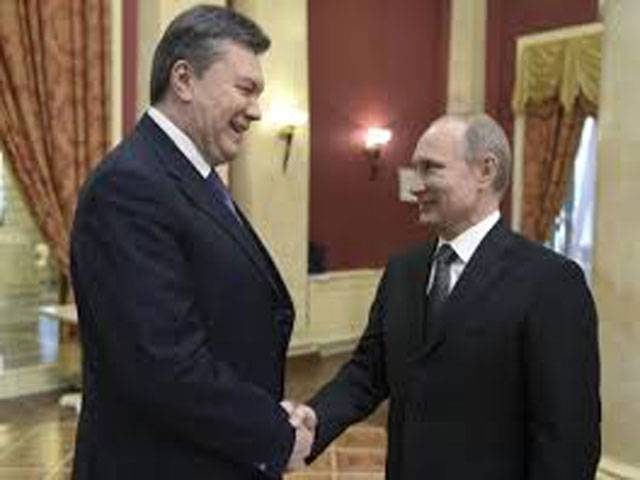BOCHAROV RUCHEI - Russia increased economic pressure on Ukraine on Saturday by drawing a link between disbursement of the next tranche of its $15 billion (9 billion pounds) aid package to Kiev with repayment of a hefty gas bill owed to Russian firms.
The linkage, made in comments by Russia’s finance minister, came as the Kremlin confirmed President Vladimir Putin had held private talks with Ukraine’s leader Viktor Yanukovich in Sochi on Friday before the opening of the Winter Olympics. No details of the leaders’ talks were disclosed. Moscow agreed on credits and cheaper gas for Kiev in December to help it meet huge debt payments, gaining the edge over the European Union in a tug-of-war for influence in Ukraine, a former Soviet republic of 46 million people.
Ukraine, whose ailing economy and hryvnia currency have been further battered by months of anti-government protests, sorely needs the next tranche of Russian loans, worth $2 billion.
Russian Finance Minister Anton Siluanov said Russia would follow through on its loan commitment, but also pointedly highlighted Ukraine’s outstanding gas debt of $2.7 billion.
“We will fulfil what we have promised to Ukraine, but we would like the Ukrainian side to comply with the obligations that it has committed to,” Siluanov told reporters at Putin’s Black Sea residence of Bocharov Ruchei. The gas debt was due for repayment in late January, but Ukraine has not paid up, he added. “We did not link the (aid) tranches with the transactions between Naftogaz and Gazprom, but they both are state entities. We always agree that our (obligations) between the states and (state) companies should be complied with,” Siluanov said. Moscow has used gas before as a tool to exert pressure on countries such as Ukraine which are heavily dependent on Russian gas imports.
Ukraine’s political crisis blew up last November when Yanukovich turned his back on a trade pact with the European Union in favour of closer economic ties with Russia, the country’s Soviet-era overlord.
But despite the aid package agreed with Moscow, Yanukovich’s position has become much weaker in the face of sustained and sometimes violent street protests. Last week, his pro-Russian prime minister quit in an abortive attempt to defuse the protests. Moscow has accused the Western-backed opposition leaders in Kiev of fomenting the unrest in order to topple a democratically elected president. The political crisis has also badly strained relations between Russia and Western powers, with both sides accusing the other of interfering in Ukraine’s affairs.
Siluanov expressed uncertainty over who to speak to in Kiev, with parliament yet to decide on a new prime minister.
“We would also like to have more understanding of who among our (Ukrainian) colleagues we should be talking to,” he said. While the details of Friday’s meeting between Putin and Yanukovich are unclear, a similar tete-a-tete between the two leaders late last year is thought to have led to Yanukovich’s last-minute decision to spurn the trade deal with the EU.
The Sochi meeting is likely to have placed the ball firmly in Yanukovich’s court.
It follows talks on Wednesday in Kiev between the Ukrainian leader and the EU’s foreign policy chief.
Catherine Ashton told him the EU was ready to help Ukraine in many ways, both financially and with expertise, to improve its long-term economic development.
Wednesday, April 17, 2024
Russia presses Ukraine on gas debts as leaders meet

Caption: Russia presses Ukraine on gas debts as leaders meet
Pride and hype as F1 roars back to China after Covid absence
10:36 PM | April 16, 2024
No let-up in Karachi street crime incidents
10:35 PM | April 16, 2024
Stock market today: Most of Wall Street weakens again as Treasury yields rise more
10:34 PM | April 16, 2024
Muslim K-popstar Daud Kim buys land to build mosque in South Korea
10:33 PM | April 16, 2024
Punjab Stadium unavailability derails National Challenge Cup 2023 Final Round
10:28 PM | April 16, 2024
Political Reconciliation
April 16, 2024
Pricing Pressures
April 16, 2024
Western Hypocrisy
April 16, 2024
Policing Reforms
April 15, 2024
Storm Safety
April 15, 2024
Democratic harmony
April 16, 2024
Digital dilemma
April 16, 2024
Classroom crisis
April 16, 2024
Bridging gaps
April 16, 2024
Suicide awareness
April 15, 2024
ePaper - Nawaiwaqt
Advertisement
Nawaiwaqt Group | Copyright © 2024





